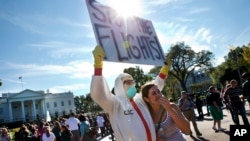President Barack Obama has urged Americans not to give in to Ebola "hysteria or fear," urging people to keep the situation in perspective.
In his weekly address Saturday, Obama said the U.S. may see more "isolated" cases of the deadly disease, but he is "absolutely confident" that officials can prevent a serious outbreak in the United States.
The president said the three cases of Ebola already diagnosed in the country do not represent an outbreak or epidemic.
"First, what we're seeing now is not an 'outbreak' or an 'epidemic' of Ebola in America. ... Second, Ebola is actually a difficult disease to catch. ... Third, we know how to fight this disease," he said.
Still, authorities are choosing to exercise extreme caution.
Emergency workers in Dallas, Texas — where the first U.S. Ebola patient died — rushed to close down a bus and train station after a female passenger vomited on the platform.
Officials falsely believed she was on an Ebola monitoring list.
But a Carnival Lines cruise ship is headed back to Texas from the Gulf of Mexico. A passenger who worked at a Dallas lab that handled the Ebola patient's specimens has isolated herself in a her cabin, fearing she may be ill.
Two nurses who treated the Ebola patient are hospitalized with the disease. Investigators are looking into how they became sick.
Meanwhile, Canada says it will send 800 vials of an experimental Ebola vaccine to the World Health Organization in Geneva starting Monday — and the United Nations World Food Program airdropped emergency rations to more than 260,000 people in the Waterloo district of Freetown, the capital of Sierra Leone.
The area has seen an usually high number of cases of Ebola. Many families have been quarantined.
Sierra Leone, Guinea, and Liberia, all in West Africa, are the epicenter of the world's Ebola outbreak. More than 4,500 people have died and health experts predict thousands of more deaths before the end of the year.
US to lead response
Obama said the United States will continue to lead the global response in West Africa to stop the disease at its source.
But Obama dismissed lawmakers' calls for a travel ban on the region, saying that "could actually make the situation worse."
He said such an attempt to "seal off an entire region of the world" would make it harder to transport health workers and supplies. The president said it could also make the disease harder to track by causing people to evade screening.
Obama's remarks on Ebola come after he named an Ebola "czar" to coordinate U.S. efforts to fight the virus. Ron Klain is a former aide to Vice President Joe Biden.
The World Health Organization (WHO), meanwhile, said it will conduct a "full review" of the global Ebola response after the outbreak is under control.
WHO report
The WHO is not commenting on an internal report obtained by the Associated Press saying the agency missed opportunities to prevent Ebola from spreading in West Africa.
According to the AP, the WHO blamed its staff for a slow response to the Ebola outbreak. It said failed to grasp that traditional infectious disease containment methods do not work in a region with porous borders and broken health infrastructures.
The leaked report said "nearly everyone involved in the outbreak response failed to see some fairly plain writing on the wall."
U.S. Secretary of State John Kerry told diplomats stationed in Washington Friday that the international community must work together to resolve the Ebola crisis.
He said barely a third of the $1 billion the U.N. said is needs to fight the disease has been contributed. Kerry warned that without more help, delivered quickly, Ebola will become a global crisis like polio.
Former Cuban leader Fidel Castro said Cuba is ready to cooperate with the United States in the fight against Ebola.
In an article in Cuban state media, Castro said such collaboration would be for "the peace of the world."
Cuba aid
Cuba has already sent 165 doctors and nurses to Sierrra Leone and is sending another 296 health experts to Liberia and Guinea.
The WHO reported a total of more than 9,000 confirmed cases of Ebola. The new numbers released Friday show all but nine of the more than 4,500 known deaths from the virus occurred in Guinea, Liberia or Sierra Leone.
Humanitarian aid efforts are under way in all three of the worst-affected countries.
The United Nations World Food Program (WFP) is delivering emergency food rations to 265,000 people affected by Ebola in Sierra Leone - many of them families under quarantine.
WFP said the aim of the distribution is to give the families enough to eat so they do not leave their homes to look for food.
Some information for this report comes from AP and Reuters.





